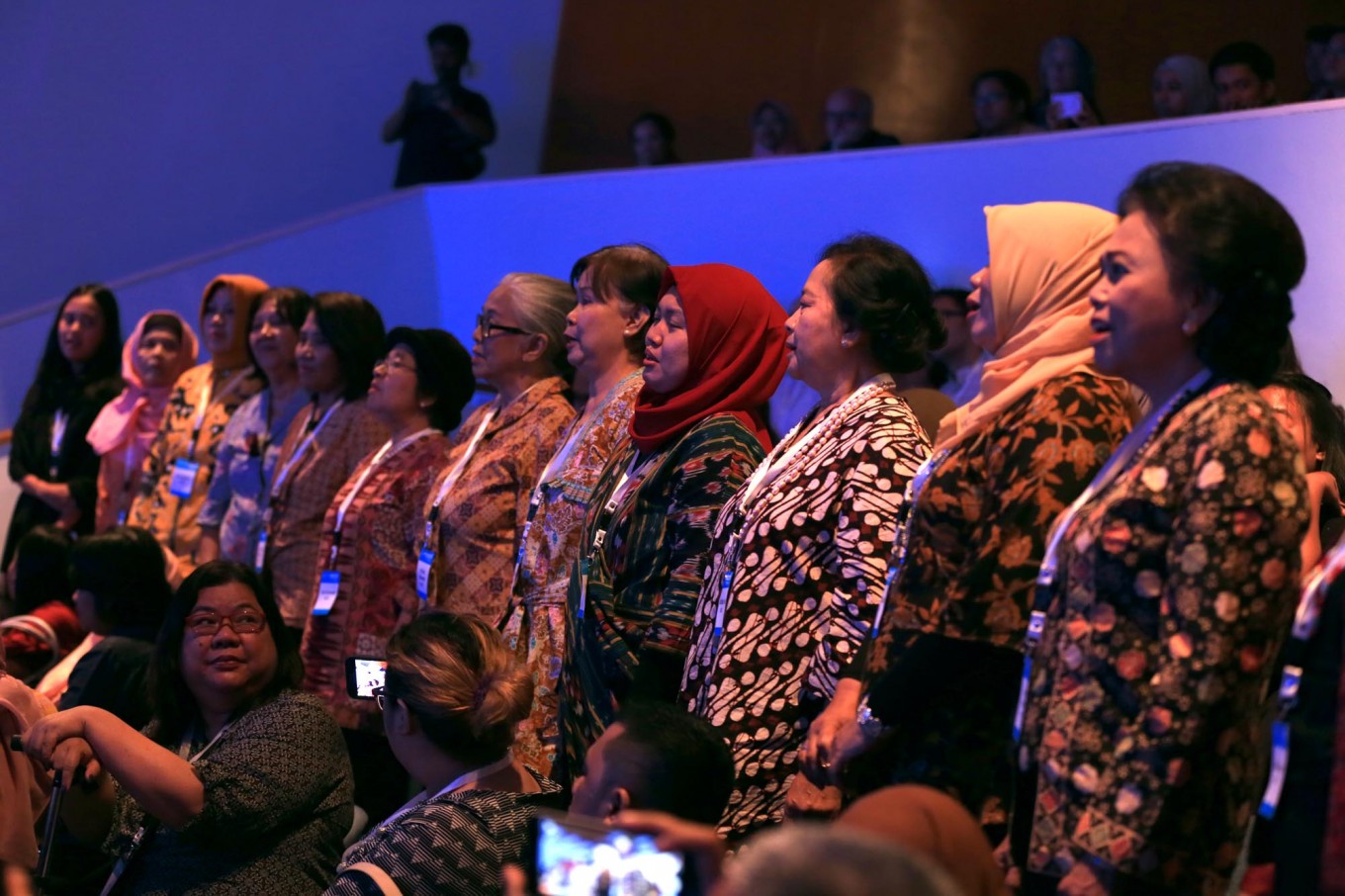Popular Reads
Top Results
Can't find what you're looking for?
View all search resultsPopular Reads
Top Results
Can't find what you're looking for?
View all search resultsDialita choir, a celebration of hope
The Dialita choir, made up of survivors of 1965, symbolizes strength, resilience and hope.
Change text size
Gift Premium Articles
to Anyone
The Dialita choir's "Song for my Child" concert on Dec. 13 was both an emotional and empowering experience.
The performance moved the audience and brought tears to many eyes, while offering an alternative form of dialogue.
For me, the tears that night were ones of joy and hope.
The program was inspired right from the opening. The producer wanted to ensure that the audience received a clear message that Dialita was a not a symbol of shattered lives, but that the choir, made up of survivors of 1965, symbolized strength, resilience and hope.
Their first song, "Salam Harapan" (Greeting of Hope) provoked a great sense of optimism. The song, written in jail as a gift to fellow women political prisoners celebrating their birthdays, represents the faith that there is always hope even in the moments of greatest darkness – a birthday wish greater than any gift in a box.
Written in prison, Dialita’s songs are an invitation to the younger generation of Indonesians to engage in a dialogue about the long-forgotten stories of survival, love and hope. The performance of talented Indonesian singers including Sita Nursanti, Bonita, Kartika Jahja, Endah Widiastuti and Junior Soemantri in the first part of the concert, and the beautiful musical arrangements of musicians Petrus Briyanto Adi, Imada Hutagalung, Jonathan Palempung, Achi Hardjakusumah and Wizra Ucha, brought out the beauty of the Dialita songs and spoke directly to the audience.
The collaboration offers an important entry point to understand the participatory process required to make sense of the injustice, inequalities and marginalization experienced by the survivors.
The involvement of many talented young singers and musicians in co-constructing alternative narratives for structural transformation and change is a sign of success in the survivors’ struggle. The moments in which each guest singer shared their own personal experiences through song reflected the opportunities that music offers to open up conversations about history. The emotions that arise from music – be they joyful, sad or angry – are necessary for critical thinking and learning, according to educator Paulo Freire in his seminal 1970 work Pedagogy of the Oppressed. This was reflected in the singers’ stories.
The emotions conveyed in Dialita’s stories open up spaces of communication to understand how the events of 1965 affected not only communities and survivors but all of us as a nation. The stage, the music, the decorations and the colorful kebaya were all used as elements to facilitate connections between the narratives, the songs and the audience.
That night, I saw how songs and performances could pave the way for collaboration and solidarity, opening the door for dialogue. The widespread desire to engage in such a dialogue was evidenced by the size of the audience at Graha Bhakti Budaya on Wednesday night.
My mother expressed her opinion thusly, “These women are sincere in their struggle and I think the songs are beautiful, full of love and hope. For these young people, it’s like watching their mothers singing… no wonder there are so many of them attending the concert.”
Love was a salient message of the concert. “Kami semua cinta panjenengan (We all love you)" said one of the singers, a statement followed by the presentation of a rose and a hug from Junior Soemantri to Mudji, one of the choir members. These acts, and the hugs from the audience who joined the performers on stage after the concert, captured the words of Freire, who said that “…love is an act of courage,” and it was through these meaningful acts of love that the audience entered into a dialogue.
At a time when discussions about justice in general and around 1965 in particular, are seen as vital, these songs and this performance offer insights in line with what Australian scholar Desmond Manderson describes as “attempts to understand people and communities precisely on their own terms."
This begins with an effort to comprehend and is followed by understanding. The aesthetic element of the musical arrangement, the artistic stage decoration, the colorful dress, the melodious voices, speak softly to young people, to those who have never heard the survivors’ stories. Thus, a sense of witnessing and a shared field of discussion is created.
In the context of marginalization, social change specifically attends to the co-creation of communication infrastructures, communication tools and communicative spaces where the voices at the margins of societies can be heard. (kes)
***
Dyah Pitaloka is a lecturer in Indonesian Studies at the School of Languages and Cultures, the University of Sydney.
---------------
Interested in writing for thejakartapost.com? We are looking for articles and opinions from experts in a variety of fields, as well as others with strong writing skills. Submit your original piece to community@jakpost.com on the following topics: lifestyle (beauty, fashion, food), entertainment, science & technology, health, parenting, social media and sports. Click here for more information.











